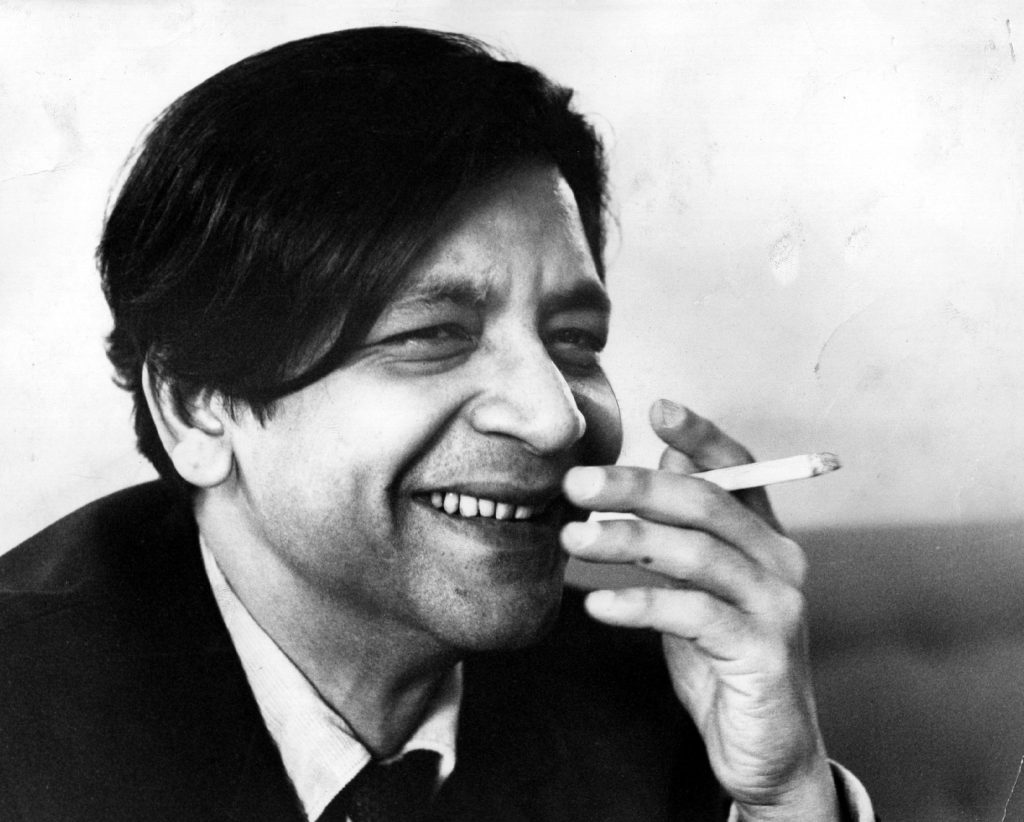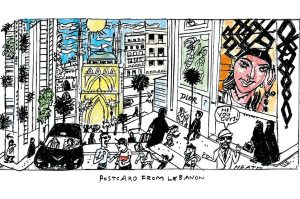V.S. Naipaul, who died on Saturday at the age of 85, was sustained most of all by self-belief. The society in which he launched himself as a writer was not created to support a man like him. It was designed to degrade him. His career was without precedent. When he arrived in England as a teenager armed with a scholarship to Oxford, he was a man apart, the descendant of Indians shipped out by the British Empire to toil as indentured labour in the sugarcane plantations of the Caribbean. Against his ambition, self-worth and dignity were arrayed the stifling prejudices of a conservative and hierarchical nation long accustomed to stamping on people of his appearance. The racism Naipaul was subjected to was of a vicious and crippling variety. When he attended an interview for a trainee position at the BBC, the interviewers erupted in sniggers. Naipaul did not complain. He could not. ‘You couldn’t be a victim in the 1950s’, he once said. ‘There wasn’t the market.’
The exposure to bigotry bred despair, but not self-pity. ‘I have got to show these people that I can beat them at their own language’, Naipaul had said in a letter to his beloved father from Oxford. After two false starts, Naipaul, without rejecting the world, retreated inwards and mined his childhood memories and family history to feed his early novels: The Mystic Masseur (1957), The Suffrage of Elivra (1958), Miguel Street(1959), and, his acknowledged masterpiece, A House for Mr Biswas (1961). Now his formidable talent unsettled his peers. ‘That clever little nigger Naipaul has won another literary prize,’ Evelyn Waugh complained in 1963.
If Naipaul had written nothing else after Biswas, he would still be counted among the greatest writers of the 20th century. But it is the range of his output after Biswas that qualifies him as the greatest writer of English prose of the past six decades. Naipaul did not, in the more than 30 books of fiction and nonfiction he published, attempt to write lapidary sentences. He strove always to strip language down to its basics. Literature’s purpose, he believed, was to reveal and not to obscure. He abhorred jargon. And his directness is what made him so unpalatable to critics as he began writing from Africa, Americas and Asia.
He travelled to Iran, Pakistan, Indonesia, Malaysia and wrote with shattering forthrightness about the effect of Islam, a faith originally of the Arabs, on non-Arab Muslims. In mimicking the Arabs and their austere ways, the converts and the descendants of converts, he wrote, were stamping on their own rich heritage. The Arabs had stormed Sindh, now in Pakistan, in the 8th century and spent days slaughtering the natives and plundering their riches. But Pakistan’s great public works were given the names of the Arab conquerors. Naipaul noticed that it was the defeated indigenous king, the ancestor of the modern Pakistani, who was despised.
The hatred of Pakistan’s Arabs manqué for the natives rooted in the culture of their soil was not theoretical. It had fatal consequences. In 1971, the Pakistani army slaughtered three million people in what is today Bangladesh – the largest single massacre of a predominantly Muslim population – because it regarded them, as the US consul-general in Dhaka put it, as ‘Hindu-corrupted’ heretics. ‘It turns out now,’ Naipaul wrote after studying Pakistanis desperately pretending to be Arabs by denying their pluralistic pre-Islamic past, ‘that the Arabs were the most successful imperialists of all time; since to be conquered by them (and then to be like them) is still, in the minds of the faithful, to be saved’. Naipaul’s incisive observation, published more than three decades ago in Among the Believers (1981), was validated just last month by Imran Khan, Pakistan’s pious new prime minister-elect, when he declared that his aspiration was to build in Pakistan a new Medina.
Sympathetic on the page to the tyrannised, the exploited and the discarded, in life Naipaul was a man without sentiment or illusions. ‘Hate oppression. Fear the oppressed’, he said. His fidelity to truth as he perceived it unnerved both liberals and conservatives. On migrants from anti-Western Muslim states: ‘They appealed to the ideals of the alien civilisations whose virtues they denied at home.’ On Argentinians: ‘They lie to themselves every day and try to invent a sort of cosmic mythology … Genocide is their history’. And on British attitudes to slavery: ‘They reduce the history of slavery not to the horrors of the crime extending over a couple of hundred years, but to the few years of the fight to abolish it.’
For me, however, it is Naipaul’s writing on India – beginning in the 1960s and culminating in the 1990s – that constitutes his most accomplished work. Hinduism has seldom known a fiercer or more trenchant critic. Naipaul dismantled every consoling lie Indians told themselves to reveal a wounded civilisation. I can still remember reading An Area of Darkness (1964) and India: A Wounded Civilisation (1976), in a single sitting, and feeling, for the first time, the power of the written word to disconcert. These books crawled under my skin. They shook me. They were the closest thing to an out of body experience I have ever known. After this, I approached Naipaul’s books with the reverence with which a believer approaches holy texts.
Naipaul troubles Indians so much because of his honesty. If his portraits appear unflattering, it is because they are not tempered with spurious politeness. He did us the greatest honour any observer ever could: he saw us as we were. None of our fortifications against foreign scrutiny could withstand the sharpness of his vision. His India books truly are remarkable, full of the author’s confusion and rage at his ancestral homeland but also a refreshing clarity about its history and a deep affection for its people.
Naipaul maintained a tough exterior throughout his travels, but there is a moment in An Area of Darkness when, on a train from southern India, accompanied by army officers and soldiers being transported to the frontlines to resist Chinese troops as Mao Zedong launched an invasion of India, he abruptly softens up. ‘I did not want India to sink’, he concedes, ‘the mere thought was painful’. The prospect of India’s defeat moves him, for the only time, to lyricism: ‘Out of its squalor and human decay, its eruptions of butchery, India produced so many people of grace and beauty, ruled by elaborate courtesy. Producing too much life, it denied the value of life; yet it permitted a unique human development to so many. Nowhere were people so heightened, rounded and individualistic; nowhere did they offer themselves up so fully and with such reassurance. To know Indians was to take a delight in people as people’.
The accusation that Naipaul was trying to comfort white reactionaries in the West with his depictions of non-Western places tells us more about his critics than about Naipaul. Whenever I have come across such charges, imputing the basest motives to Naipaul, I have wondered: have they read his work? Because nobody in the English language – not even Orwell – wrote with greater acuity about the delusions, the horrors, the futility and the wastefulness of European imperialism than Naipaul.
The allegation that Naipaul harboured Hindu-supremacist sympathies because he wrote and spoke frankly about the devastation caused by the Islamic invasions of India is impossible to reconcile with the fellow-feeling for downtrodden Muslims that courses through his writings. Naipaul’s blunt assessment of India’s pre-colonial history was followed by an injunction that has conveniently been overlooked: ‘The past has to be seen to be dead; or the past will kill.’ Accept what happened, Naipaul was saying, and move on. India’s preening post-colonial elite of course expressed contempt for Naipaul. Today, the secular state they panegyrised is on the deathbed. The past is suddenly alive again, and people are being killed in its name. (Naipaul himself is despised by Hindu extremists in India for marrying a Pakistani woman.)
In the so-called Third World, Naipaul was read with diligence and devotion. It is the people who set themselves up in the West as the authentic representatives of the Third World who were most irked by Naipaul. Part of the reason for this, as the Indian novelist Amitav Ghosh candidly admitted, was that Naipaul’s writing uncovered ‘truths that were too painful to acknowledge’. There was a genuine expectation among the permanently aggrieved but rarely intelligible eminences of post-colonial thought at Western universities that Naipaul, an unapologetic believer in what he called ‘universal civilisation’, should perform a role on their behalf. When he did not, the attacks turned ad hominem. Naipaul was traduced as a careerist who succeeded because he ingratiated himself with white masters. The Nobel, Naipaul’s admirers justly felt, was withheld for too long from a writer who, as Irving Howe suggested, was without equal by the close of the 1970s.
The last piece of writing Naipaul published was an essay on ISIS in 2015. It was a phenomenally alert work, coaxed out of him by Geordie Greig, who – along with James Wood, Jason Cowley, and Zoe Heller – is one of a small group of a younger generation of British writers and editors who understood and valued Naipaul’s insights. A voice such as Naipaul’s will probably not be allowed to rise today, in our age of hot takes and constant outrage. The ‘respectable’ journals will not open themselves to him.
Condemn Naipaul for his private cruelties. Deplore the irascible provocateur he relished playing in interviews. But read his books. Because any idea of the 20th century formed by omitting Naipaul’s oeuvre is an incomplete and impoverished idea. His works, embodying the triumph of unremitting perseverance against insuperable odds, anticipated the fervours that define our times. They will endure long after Naipaul’s criticasters have faded from the scene. As he said in his Nobel lecture in 2001, ‘everything of value about me is in my books’. The world is enhanced by the outstanding literary legacy Naipaul, refusing to become nothing, bequeathed it.
Kapil Komireddi’s The Malevolent Republic: India Under Modi will be published by Hurst in the winter.


















